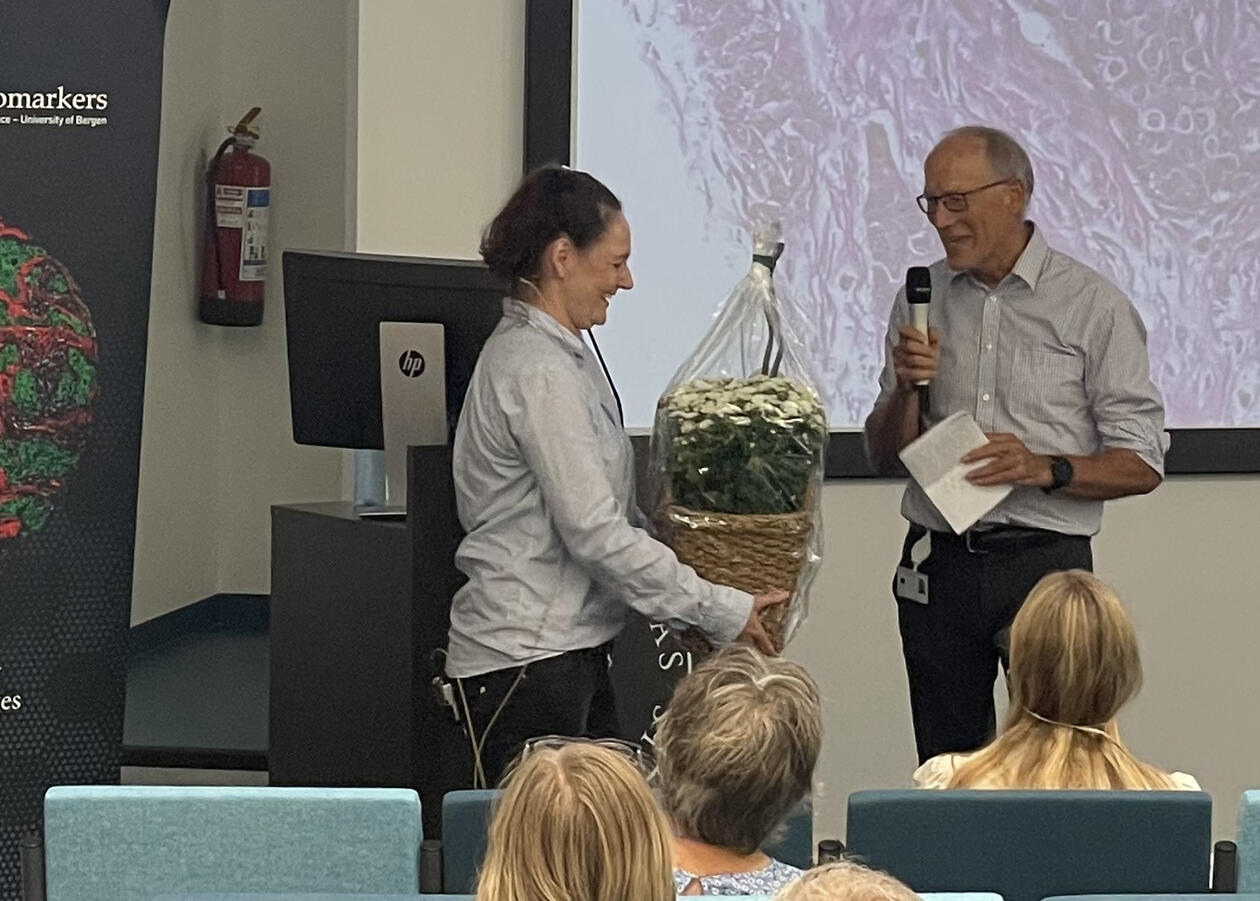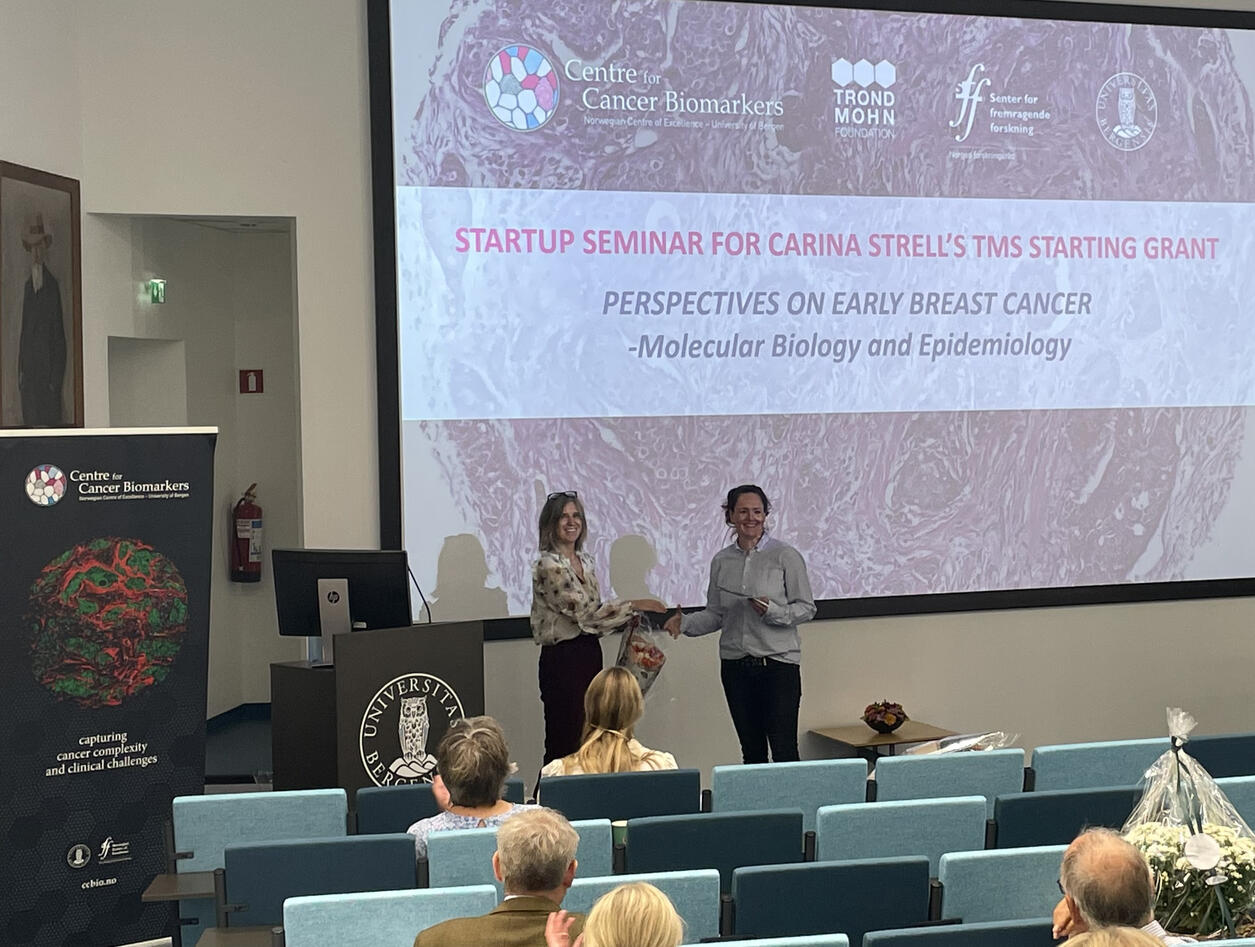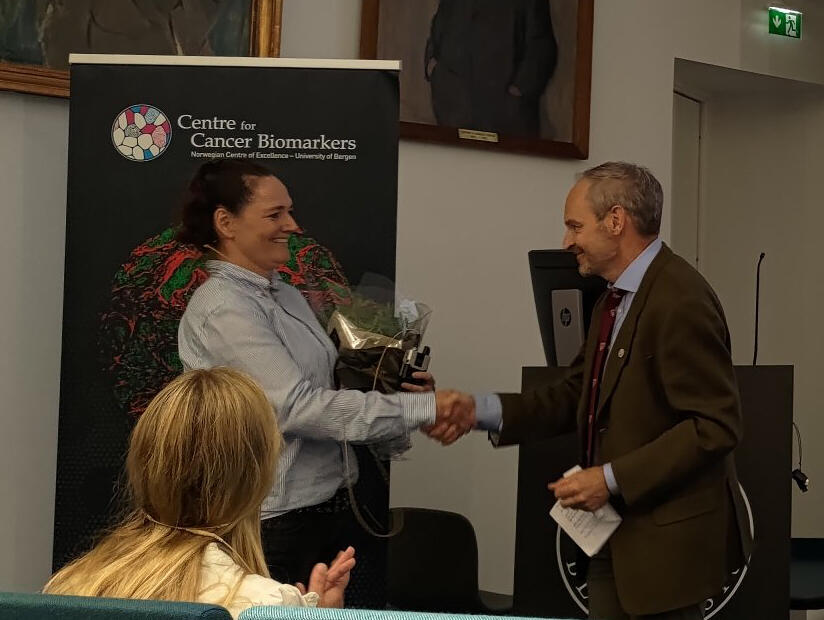Official welcome to Carina Strell
Flowers and smiles were in abundance when CCBIO, the Department of Clinical Medicine, the Medial Faculty and the Trond Mohn Foundation welcomed Carina Strell to the University of Bergen in a CCBIO Startup Seminar August 25.

Hovedinnhold
The Trond Mohn Foundation awarded this year Carina Strell with a TMS starting grant for her project Understanding Early Breast Cancer Evolution in Space and Time (EvoMaps). Strell has a long-term collaboration with the Lars A. Akslen group at CCBIO, and her project is now starting up at CCBIO.
Better understanding of breast cancer evolution
In her project, Strell aims to understand the biological mechanisms behind why some women experience recurrent and/or treatment resistant breast cancer while others do not. The hypothesis is that breast cancer progression and therapy response are not only dependent on the tumor cells alone, but also on the surrounding tissue microenvironment. The overall aim of this project is to uncover and map new mechanisms of early breast cancer evolution.
In the CCBIO Seminar, Strell gave the presentation Tumor-Stroma Interactions Driving Progression and Therapy-Resistance of DCIS, explaining how getting a better understanding of breast cancer evolution early on can improve treatment by identifying new therapeutical targets to overcome radio resistance and establishing new biomarkers to reduce the current overtreatment. Using novel molecular tools for advanced tissue analysis, she will perform a systematic exploration of the genetic properties of tumor cells in relation to their surrounding microenvironment over the course of disease progression and the development of treatment resistance. She explained how she in her project will use the Hyperion Imaging System at CCBIO to investigate genotype-microenvironment interactions at the onset of invasive disease.
Breast cancer from other angles
The two other speakers shed light on the importance of breast cancer research from different angles.
Therese Sørlie gave the talk Intrinsic subtypes and spatial heterogeneity in Ductal Carcinoma In Situ (DCIS), showing how this non-invasive form of breast cancer has increased dramatically during the last decades, especially after the introduction of mammography screening. In DCIS, abnormal cells are contained within the milk ducts while the basement membrane is intact. The heterogeneity in DCIS is at least as large as for invasive breast cancer and underscores the need for comprehensive multi-disciplinary studies to better understand the risk potential of DCIS and refine the treatment for those with high risk for progression. Sørlie’s talk covered her group’s ongoing work on studying the molecular heterogeneity in DCIS and the relevance of the intrinsic subtypes of breast cancer in breast tumor progression.
Solveig Hofvind presented early detection of breast cancer in a screening and registry perspective, showing statistics on how breast cancer is the most frequent cancer type among women in the world, with an increased incidence for invasive breast cancer mainly for stage I. Survival from breast cancer has increased substantially during the last decades. Hofvind presented the BreastScreen Norway program, which aims to reduce breast cancer mortality by detecting the tumors at an early stage. The program started in 1996 and invites women aged 50-69 to biennial mammographic screening. Screen-detected breast cancer is shown to be prognostic favorable compared to symptomatic cancer, with smaller tumor diameter, lower grade, less lymph node involvement, lower Ki67 and a higher proportion of hormonal positive tumors. A recent study showed about 40% reduction in breast cancer mortality among women aged 50 years and older, after implementation of BreastScreen Norway. The reduction was explained by implementation of the screening program and improved treatment. Women treated for screen-detected cancer also report higher QALY compared to those treated for symptomatic breast cancer.
Open for collaboration
Carina experienced the seminar as a great welcome. “I truly enjoyed the event, it was so inspiring and motivating and everybody was so welcoming and open,” she says. “It gave me the opportunity to present my work to my new colleagues and hopefully set the ground for collaborations in the future,” she continues. “I appreciated a lot that CCBIO also invited Therese and Solveig as speakers to the seminar, thereby I could directly make connections to leading scientists in my research field of early breast cancer; we had also a very nice dinner altogether and already set plans for common projects. After the seminar, I got interesting requests from potential PhD students and postdocs that were impressed by my work, and that is of course very important for me. I thank CCBIO and the department a lot for this great welcome and their efforts!” she says.
Carina is currently setting up an office at the hospital’s main building, 1st floor, at the Pathology department close to the CCBIO offices, sharing office with CCBIO Associate Investigator Agnete Engelsen. “It is a pleasure to share office with Agnete, I am convinced we will have many good discussions and can complement each other's work,” she says. She is also very pleased that despite its reputation, Bergen has been presenting itself from its very best, with only 1,5 days of rain in her first two weeks!
Strengtening the breast cancer field
The CCBIO Director Lars A. Akslen finds it highly important to strengthen the breast cancer research at the UiB. “I have been very impressed by Carina’s work over the years and have also been fortunate to collaborate with her. She works hard and is always “on target”, and I am convinced that her innovative approaches in the breast cancer field will continue to stimulate our efforts at CCBIO,” Akslen concludes.


